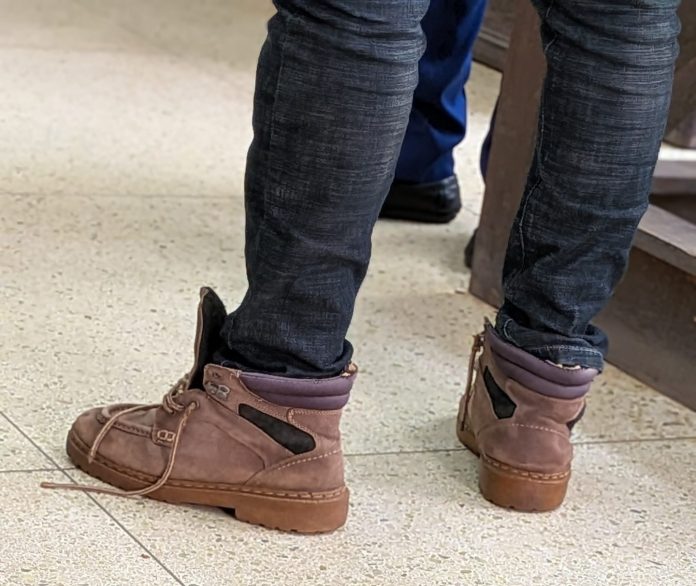By Kemeseng Sanneh (Kexx)
A key defence witness in the high-profile murder trial of Ousainou Bojang, who is accused of fatally shooting two police officers and injuring a third at the Sukuta-Jabang traffic lights in September 2023, testified on Monday that a pair of shoes presented by the police as critical evidence belonged to him—not the accused.
The witness, Famara Bojang, who is the elder brother of the accused, told the High Court in Banjul that the shoes in question, which were recovered from the family compound, had no connection to the alleged crime and were his personal property.
The testimony adds a new layer of complexity to a case that has captivated national attention due to its violent nature, alleged familial involvement, and questions over the handling of evidence. Ousainou Bojang is facing multiple charges, including murder and attempted murder, while his sister, Amie Bojang, is charged as an accessory after the fact. Both have pleaded not guilty.
In his testimony, Famara Bojang recounted his interactions with Ousainou on the night of the shooting, saying his brother visited their home between 9 p.m. and 11 p.m. to apologise over a personal misunderstanding involving a woman. Famara insisted that Ousainou was present at the family home during the hours surrounding the shooting incident and that the pair, along with another family member, reacted with shock when news of the police shooting broke online.
The defence used the opportunity to highlight inconsistencies in the prosecution’s narrative, particularly regarding physical evidence. Famara said that during a police search of the family compound, officers seized a pair of shoes they claimed were worn by the suspect at the time of the crime. He stated the shoes were his and that he had been wearing them around the house.
In a dramatic moment during the proceedings, the shoes were brought into court and presented to Famara. He identified both a brown and a green pair as his own and demonstrated this by wearing them in front of the judge. The shoes reportedly fit him comfortably. “They are mine. I was wearing them,” he said, contradicting the police’s assertion that they belonged to his brother.
Famara also testified that police officers threatened him when he challenged their claim. “When I told them the shoes were mine, one of them said, ‘shut up’ and warned that I could be arrested if I continued arguing,” he said.
Under cross-examination by Director of Public Prosecutions A.M. Yusuf, Famara stood by his statements and acknowledged that he knew Ousainou had a white partner, though he clarified that the woman shown to him on Ousainou’s phone was not the same white woman he had previously met.
In another significant development, defence lawyer Lamin J. Darboe requested the production of a statement that Famara allegedly gave to police while in custody. The prosecution said it had not received that document from the police. Justice Jaiteh subsequently issued an order compelling the Commissioner of the Anti-Crime Unit to produce the statement—or, if no statement exists, submit an affidavit explaining why.
The judge emphasised the importance of such evidence in ensuring a fair trial. “This court has a constitutional and statutory duty to guarantee a fair hearing,” Justice Jaiteh said, warning that failure to comply with the order could amount to contempt of court.
The case has been adjourned to June 2, 2025, pending the production of Famara Bojang’s alleged police statement.
















